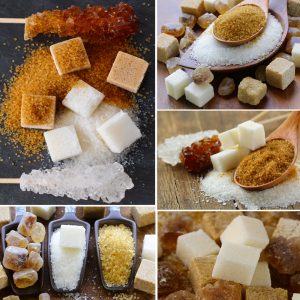
Sugar: could you be addicted?
Humans are naturally attracted to sugar – in hunter gatherer times sugar enabled us to distinguish between edible and toxic substances. The enjoyment of sugar enhanced hunger, to encourage more consumption of the ‘safe’ stuff! Sweet also meant a very quick source of energy, vital for the flight or fight response necessary for survival in those times.
Today, our instincts for sweet is more of a hindrance than a help. Sugar is produced in such processed forms that they contain very little of the original nutrients inherent in them.
One of the main reasons sugar is harmful is because of the fructose (simple sugar). Whilst small amounts from fruit is considered alright, large amounts added to the diet (both consciously and unconsciously) can have disastrous effects on our health – including but not limited to type 2 diabetes, heart disease and cancer. Fructose can only be metabolised by the liver – which in Western society is a big problem. Too much fructose turns into fat and is stored either in the liver (causing fatty liver and insulin resistance) or is carried out in the blood, raising triglyceride levels deposits in the cells. These deposits cause our cells to become insulin resistant which is purported to be the main reason for the huge increase in Type 2 Diabetes as well as obesity.
 In modern society, many of us are operating in a state of Functional Hypoglycaemia, characterised by fluctuating blood glucose levels and causing symptoms such as extreme tiredness, depression, vertigo, joint pain, abdominal pain, blurred vision, insomnia, anxiety, muscle pain, emotional instability, restlessness, irritability, headaches, backache, difficulty concentrating, mental confusion, forgetfulness, cravings, mood swings, allergies, cold hands and feet; to name just a few.
In modern society, many of us are operating in a state of Functional Hypoglycaemia, characterised by fluctuating blood glucose levels and causing symptoms such as extreme tiredness, depression, vertigo, joint pain, abdominal pain, blurred vision, insomnia, anxiety, muscle pain, emotional instability, restlessness, irritability, headaches, backache, difficulty concentrating, mental confusion, forgetfulness, cravings, mood swings, allergies, cold hands and feet; to name just a few.
Sound familiar?
These symptoms are fed and exacerbated by a diet higher in refined sugar, coffee and other stimulants combined with long periods between meals and stress.
Sugar is one of the most addictive chemicals known to mankind. When you consume fructose, it stimulates the same reward centres in your brain as cocaine and heroin. Every time we consume sugar the cravings get stronger; this is because the body releases far more insulin into the blood than necessary, which decreases the release of the brain hormone serotonin (which provides the feeling of satisfaction, signalling us to stop eating). Hence, a person addicted to sugar will consume more and feel hungry much more quickly than a non-addicted person.
Unbeknown to us mere mortals, almost everything in our modern day food chain is laced with sugar, even your favourite bread contains hidden sugar, and that “healthy lunch alternative” sushi contain sugar soaked rice to add sweetness and ‘western flavour’. So our best weapon is to educate ourselves; learn the basics and start to read labels.
There are two types of sugars – those that are nutritionally beneficial (contain vitamin and minerals) and those that are not. The latter are known as ‘nutrient robbers’ as they require nutrients in order to be utilised in the body (ie. They ‘take’ more than they ‘give’).
The first type, the nutritious ones, include (in order of decreasing nutritional value);
- Black Strap Molasses – highly nutrient dense including B vitamins and minerals; chromium, zinc, calcium, magnesium , phosphorus and iron. It’s important to choose organic sources as it is also the pesticide carrying part of the sugar cane.
- Barley malt extract – mainly maltose (a complex sugar), made from fermented barley containing the nutrients of barley plus B vitamins
- Amazake – made from an ancient, oriental whole grain (cooked brown rice injected with rice koji); it’s an excellent alternative to sugar
- Date sugar – ground dates (not really sugar), high in fibre and rich in minerals iron, potassium plus vitamin A. Does not dissolve easily in liquids; otherwise a good alternative
- Raw honey – contains many therapeutic benefits, however once heated all health properties are destroyed
- Maple syrup – whilst an excellent mineral source including phosphorus, potassium, calcium and iron, it is highly processed. Ensure it is pure maple syrup and not flavoured corn syrup (the stuff most commonly put on pancakes!)
- Treacle – second rate molasses (more processed form) containing some minerals
- Sugar cane juice – contains many vitamins and minerals however it’s still sugar, and therefore contains fructose: avoid
- Rapidura: pure juice extracted from the sugar cane. Because this sugar hasn’t been separated from the molasses it contains more vitamins and minerals as well as retaining the natural balance of sucrose, fructose and glucose – therefore the body is able to digest it more efficiently slowly, maintaining a lower blood sugar than refined sugar
Nutrient robbers include;
- Brown rice syrup – essentially a sweetener derived from brown rice, but without the nutrients associated with brown rice. Whilst a nutrient robber (it contains only marginal amounts of minerals including calcium and potassium), what makes it considered less harmful is its lack of fructose. Brown rice syrup is 100% glucose which can be metabolised by every cell in the body. Ensure you buy a reputable organic brand
- Coconut palm sugar – made from sap of coconut palms and has a relatively low GI, however contains roughly 35-45% fructose: avoid.
- Golden syrup – made from heated sugar to create longer chains of sucrose (disaccharide containing glucose and fructose) with no nutritional value: avoid
- White Sugar – sucrose (disaccharide containing glucose and fructose) with no nutritional value and requires supplemental B vitamins, vitamin C, zinc and a whole host of minerals in order to be absorbed: avoid
- Raw sugar & brown sugar – sucrose (disaccharide containing glucose and fructose). Refined sugar with some molasses added back in. Only marginally better than white sugar: avoid
- Honey – glucose and fructose combined plus gums, resins and minerals. Commercial honey is heated until very runny, then centrifuged (spun) and filtered until all the nutrients are destroyed. Raw honey however does contain some therapeutic uses (antiseptic, bactericidal etc) and is hailed as a superfood by some however the moment it is heated all benefits are destroyed
- Agave – a sweet syrup made from the Blue Agave plant: extraction process destroys nutrients and it is high in fructose (about 85%: higher than cane sugar!) and therefore best avoided
- Concentrated apple juice – like any fruit juice, its high in fructose and should be avoided
- Corn syrup – glucose + fructose (very similar composition to white sugar) but cheaper due to the subsidised production and the large bi-products available from corn production. This is the stuff used in most of our pre-packaged, processed foods because of its unlimited supply and cheap price. Avoid at all costs!
Artificial sweeteners are laidened with harmful chemicals and linked with cancer. Sugar alternatives, on the other hand, are plentiful – here are my picks;
- Stevia – naturally derived from a South American shrub and useful as an additive to cold drinks and meals, however once heated the taste profile is changed. Whilst calorie free, use sparingly as its 200-300x sweeter than sugar so you only need to use a tiny amount!
- Sugar alcohols: Maltitol, maltitol syrup, sorbitol, mannitol, xylitol, lactitol, lakanto, erythritol, and isomalt are examples of sugar alcohols. They occur naturally in plants, but are usually manufactured from sugars and starches. Sugar alcohols have fewer calories than sugars because they are not completely absorbed by the body. They can ferment in the intestines and cause gas, bloating, and diarrhoea. Also more than likely genetically modified. Choose organic and ensure it’s not made from corn.
The short of the story is, choose either nutrient dense sweeteners (naturally derived, minimally processed) or the least offending of the nutrient robbers – those that don’t contain fructose. Use it sparingly and ideally in combination with some good fats to help slow down the release of sugar into the blood stream.







Sorry, comments are closed for this post.